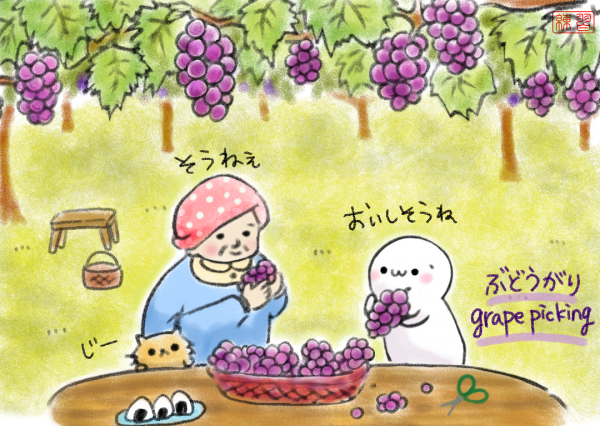A is spoken by/heard from someone/something else
- A is spoken by/heard from someone/something else
- It looks A; it seems like A
11
聞いた?レッドソックスは昨日勝ったそうだ!
Did you hear? (I heard) The Red Sox won yesterday!
0
34
明日雨が降るそうです。
I heard that it's going to rain tomorrow.
0
16
此のパソコンは使い難いそうですよ。
I heard that this computer is hard to use.
0
14
電車が遅れて居る乃だそうです。
I heard that the train is running late.
0
28
死んだふり為て難を逃れたそうです。
He says he avoided the danger by playing dead.
0
1
彼女の赤ちゃんは今月中に生まれるそうです。
I heard that her baby is due sometime this month.
0
0
高橋さんは、クリスマスに布哇で結婚式を為る予定だそうです。
I heard that Takahashi plans to have his marriage ceremony in Hawaii on Christmas.
0
18
沖縄では豚肉を良く食べるそうです。
I hear that they often eat pork in Okinawa.
0
9
彼のパン屋さんは大繁盛為て居るそうだ。
I hear that his bakery is really prospering.
0
7
彼女は来月から一人暮らしを始めるそうだよ。
I hear that she will start living on her own next month.
0
7
此の作家は、生前は有名ではなかったそうだ。
It seems that this author was not famous during their lifetime.
0
6
彼は一人暮らしを始めて親に感謝する様になったそうだ。
It seems he came to appreciate his parents because he started living on his own.
0
6
どうしたのか、彼は今日の試合に参加しないことになったそうだ。
What's wrong... I heard it was decided that he will not participate in today's match.
0
9
此の映画が公開為れる迄に、様ざまなトラブルが有ったそうだ。
I heard that this movie had various troubles by the time it came out.
0
8
明日雨が降るとキャンプは中止になるそうだ。
It seems that if it rains tomorrow the camping will be cancelled.
0
Getting the sentences
Construction
(Elements in parentheses are optional.)
Basic Examples:
落ちたそうだ ((I heard) he fell)
無理だそうだ ((I heard) it's impossible)
上手いそうだ ((I heard) it's delicious)
賑やかだそうだ ((I heard) it's lively)
Related Expressions
ということ
らしい
らしい
Where this grammar is found
Grammar usage notes
Nothing posted yet!
Questions/Discussion
Nothing posted yet!
It looks A; it seems like A
- A is spoken by/heard from someone/something else
- It looks A; it seems like A

葡萄、美味しそう!
The grapes look delicious!
23
外は雨が降りそうだから傘を持っていってね。
It looks like it will rain outside, so take an umbrella.
0
29
うん。此のレストランは高そうだから他のレストランに行こうか?
Hmm.. This restaurant seems expensive, so lets go to another place?
0
23
彼のケーキは凄く美味しそうなので、食べてみたい!
That cake looks really delicious! I want to try eating it!
0
12
雪が降りそうですね。
Looks like it'll snow.
0
23
此の料理は辛そうだから、私は遠慮するよ。
This food looks spicy so I'll pass.
0
12
加奈陀は日本よりもずっと寒そうです。
Looks like Canada is much, much colder than Japan.
0
3
此のベッドは頑丈そうです。
This bed looks solid.
0
10
此の氷は今にも割れそうだ。
This ice looks like it could crack at any moment.
0
13
彼のお祖母さんは元気そうです。
His grandmother looks healthy.
0
15
犬は不安そうに主人を眺めた。
The dog regarded his master anxiously.
0
9
彼は不服そうに口を尖らせた。
He pouted with dissatisfaction.
0
6
彼女は不思議そうに周りを見渡した。
She looked around in wonder.
0
15
彼女は愉快そうに笑った。
She laughed a merry laugh.
0
9
壁に映った彼の影は悲しそうだった。
His shadow on the wall looked sad.
0
5
彼には此方のマフラーの方が似合いそうだよね。
Looks like this muffler looks better on him.
0
-1
母の手紙を読むに付け、泣きそうに成る。
Every time I read my mother's letter, I come close to crying.
0
18
何故、君は、そんなに悲しそうな顔をする乃だい?
Why are you making such a sad face?
1
31
済みません、急用の為遅刻しそうです。
I'm sorry, they seem to be running late because of some urgent business.
0
12
新年度が近いので、父は忙しそうだ。
The new fiscal year is close so Dad looks busy.
0
7
携帯電話の電池が無く成りそうだから充電為るしか無い。
The phone looks like it's almost out of power so I've got no choice but to charge it.
0
30
店長は何時も寝不足なので、機嫌が悪そうに見える。
The store manager is always short on sleep so he looks as if he's in a bad mood.
0
Getting the sentences
Construction
(Elements in parentheses are optional.)
Basic Examples:
降りそうだ (it looks like it'll rain)
Basic Examples:
古そうだ (it looks old)
Basic Examples:
新鮮そうだ (it looks fresh)
Basic Examples:
医者ではなさそうだ (it seems like he's not a doctor)
Notes
This is based on what the subject senses (sees, feels).
With nouns, it can only be used in the negative form (present or past tense).
With nouns, it can only be used in the negative form (present or past tense).
な, に, and だ
The three particles/modifies that follow そう are chosen based on what follows:
Basic Examples
そうな+Noun: おいしそうなケーキ (A delicious looking cake)
そうに+Verb: かれは元気そうに見える (He looks energetic)
そうだ。(end of sentence/clause) そのケーキはおいしそうだ (The cake looks delicious.)
Related Expressions
がっている
ようだ
ようだ
Where this grammar is found
Grammar usage notes
It's important to distinguish this from the other そうだ meaning A is spoken by/heard from someone/something else. Note that that そうだ often has a だ before it, unlike this one.
This そうだ is only used when the speaker has some visual or other sensory information that leads them to make the statement.
雨が降るそうだ。 I heard that it's going to rain. (off the weather report etc.)
雨が降りそうだ。 It looks like it's going to rain. (looking out the window at black clouds)
This そうだ is only used when the speaker has some visual or other sensory information that leads them to make the statement.
雨が降るそうだ。 I heard that it's going to rain. (off the weather report etc.)
雨が降りそうだ。 It looks like it's going to rain. (looking out the window at black clouds)
Exceptions to the drop the い and add そう rule for い adjectives:
よい (good) -> よ - い + さそう = よさそう (seems good)
かわいい (cute) -> かわいい -い + そう = かわいそう (Does not mean seems cute! It means poor, pathetic, pitiful)
よい (good) -> よ - い + さそう = よさそう (seems good)
かわいい (cute) -> かわいい -い + そう = かわいそう (Does not mean seems cute! It means poor, pathetic, pitiful)
negative form conjugation
v ない +さそうだ
いAいく + なさそうだ からくなさそう
なAじゃ + なさそうだ 大変じゃなさそう
Nじゃ + なさそうだ 人じゃなさそう
Also for verbs in negative
Vます + そうもない、そうにない、そうにもない
1週間読めそうもない。it seems it can be read in 1 week.
安くなりそうにない。doest look that I'll be cheaper.
If you see てそう, it's from そうbeing used with the stem form of V + ている, where ている has been contracted as てる.
V + てい そう だ/な/に
V + て そう だ/な/に
Example:
疲れてそうだね (You look/sound tired)
V + てい そう だ/な/に
V + て そう だ/な/に
Example:
疲れてそうだね (You look/sound tired)
Questions/Discussion
Nothing posted yet!